
Section Four Culture
“The Instability of the Pagan Society’s Foundation on Sand”
Why Would the Church Seek to Follow This Model?
“…God’s household, which is the Church of the living God, the pillar and foundation of the truth.” –Paul (1 Timothy 3:15), 67 AD
“Go and tell this people: ‘Be ever hearing, but never understanding; be ever seeing, but never perceiving.’ Make the heart of this people calloused; make their ears dull and close their eyes.” –Isaiah (Isaiah 6:9-10), 740 BC
“ ‘Look! I am preparing a disaster for you and devising a plan against you. So turn from your evil ways, each one of you, and reform your ways and your actions.’ But they will reply, ‘It’s no use. We will continue with our own plans; each of us will follow the stubbornness of his evil heart.’ ” –Jeremiah (Jeremiah 18:11-12), 603 BC
To understand the Titanic voyage the Church is on we must understand the waters she has wandered into without a map - without the light and without the north or the south or the sunrise or the sunset - without in fact, any ability to distinguish between friend or foe, or a secure or treacherous course. The people of God have always lived in the midst of worldly cultures made up of fallen men who were left to make sense of their fate by creating philosophies. But there has also always been an alternate route, because God has always provided natural men with enough sense, direction, care, and mercy for each to find his way to God.
As in all generations the man of God in today’s Western culture finds himself in the midst of a pagan society that has made a weak attempt to develop a comprehensive philosophy by which to understand itself. The unbelieving man makes a halfhearted effort to “discover truth” and “find meaning” in this dark world, while at the same time looking over his shoulder to make sure he doesn’t get too far out of the shadows that conceal his personal wickedness. The last thing natural man wants to do is actually find the Truth! What could be worse than if that man accidently stumbled into God’s absolute reality and had all his doubt removed? It is much better to call yourself a God-seeker (even if you are a lazy, haphazard seeker) than to know without a doubt that you, a finite creature, are in rebellion against the infinite, sovereign God, the Creator and Judge of the Universe. It is easier to sleep at night if you convince yourself you have really, really tried.
Natural man is like a person lost deep in a cave who can find his way out by moving toward a light in the distance. Paul told the philosophers in Athens that God:
“God made from one man every nation of mankind to live on all the face of the earth, having determined allotted periods and the boundaries of their dwelling place, that they should seek God, and perhaps feel their way toward him and find him. Yet he is actually not far from each one of us.” (Acts 17:26-27, ESV)
Paul goes on to quote Epimenides, the Cretean philosopher/poet:
“In him we live and move and have our being.” (Acts 17:28)
Paul then tells the philosophers of Athens that “even some of your own poets have” come so close to finding the Truth when they said, “For we are indeed his offspring.” (A quote from the Greek poet Aratus, 315-240 BC, in his poem “Phaninomena” in which he describes the constellations and teaches his discoveries made through his own observations of the solar system.)
By simply using common sense and logic Paul reasoned with the Greek philosophers in Athens that since we (Jews and Greeks) are God’s offspring, or creations, we ought not to think that the divine being is like gold, silver, stone, or that God could be described by art or even man’s imagination.
“Being then God’s offspring, we ought not to think that the divine being is like gold or silver or stone, an image formed by the art and imagination of man.” (Acts 27:29)
Not only did Paul rebuke the Greeks of Athens for their incomplete understanding of God’s natural revelation of himself in creation, but even the Roman philosopher Cicero rejected the philosophical errors of the Greek philosopher Homer (from around 750 BC) concerning his misinterpretation of the nature of deity. In 45 BC Cicero wrote:
“I am convinced entirely that that which could affect so many and such great things must be a divine power…I do not imagine the Gods to be delighted with nectar and ambrosia, or with Juventas presenting them with a cup; nor do I put any faith in Homer, who says that Ganymede was carried away by the Gods on account of his beauty, in order to give Jupiter his wine. Too weak reasons for doing Laomedon such injury! These were mere inventions of Homer, who gave his Gods the imperfections of men. I would rather that he had given men the perfections of the Gods!” (Tusculan Disputations, 1. I. c. 26)
Paul then explained the grace that God had given the Greek culture by overlooking their stupid philosophies and ignorant conclusions that missed the obvious revelation God had placed within natural creation. In fact, many Greek poets, philosophers, and prophets had danced all around the natural revelation in their writings and speeches, and had failed to fully recognize the glaring Truth that could be arrived at by simple logic and reason. But, since God has a fixed day in the future when he will hold all men accountable for their understanding (or, not understanding) natural revelation, and since on that day all men will be judged through a man who God had raised from the dead, it was now time to repent!
“The times of ignorance God overlooked, but now he commands all people everywhere to repent, because he has fixed a day on which he will judge the world in righteousness by a man whom he has appointed; and of this he has given assurance to all by raising him from the dead.” (Acts 27:30-31)
Seven years after his Athens debate Paul builds on this concept of God’s general revelation in the opening chapter of his letter to the Romans written from Corinth in 57 AD. Paul agrees with both Greek and Roman philosophers of his day that God has provided evidence of his existence to all people and at all times through the existence and nature of the created world and in the created reality within which we exist.
“The supreme God holds himself invisible, and it is only in his works that we are capable of admiring him.” (Xenophon, 370 BC, Memorabilia, 1.iv.c.3)
“God the eternal, the chief ruler of the universe and its creator, the mind alone beholds; but that which is produced we behold by sight.” (Plato, 360 BC, Timaeus, Loc. C. 5)
“Thus, though you see not the soul of man, as you see not the Deity, yet, as by the contemplation of his works you are led to acknowledge a God.” (Cicero wrote in 45 BC in his series of books entitled Tusculan Disputations, 1. I. c. 28)
In Romans 1:19 Paul says that God has shown evidence to mankind concerning what may be known about God, God’s invisible attributes (eternal power and the divine nature), and God’s existence, which Paul affirms is clearly perceived since the creation of the world, and in the things he has made. This is the logic of the Greeks from 370 BC, of the Romans of 45 BC, and of Paul, the Jewish Rabbi from Jerusalem, writing to the Romans in Rome from the Greek city of Corinth in 57 AD. The natural world reveals the existence and nature of God.
That was 2,000 years ago. Now, today, in an attempt to explain the origin and details of life with the discovery of DNA, science has admitted that there is an advanced code programed into the chemical makeup of molecular structure. Bill Gates, founder of Microsoft, commented that “DNA is like a software program, only much more complex than anything we've ever devised.”
In 2007 I wrote Hope for America’s Last Generation, which includes this discussion of idols:
A strange tidbit of information I took away from my years in Sunday school was that idol worship is really, really bad. The problem was that I had never seen an idol. Whenever the Sunday school teacher would talk about idols, I would look around the classroom, trying to figure out if any of my peers were honestly struggling with the temptation to worship idols. I had a feeling nobody was…It was later explained to me that modern idol worship could include money, power, fame, or anything else we might put before God. But that didn’t sound right to me because I knew the people of Israel weren’t having trouble with money, power, or fame. They were worshipping actual stone idols. God was adamant that they not bow down to these graven images. So what would be the equivalent of an actual idol in our society today? …There were four things an idol did for its worshippers:
- Explained origin
- Identified purpose
- Developed ethics
- Determined future
Philosophy can be divided into three useful time periods. And, upon these three periods the ideologies, societies and religions of culture can be organized;
Premodern (Up to 1500)
During the “premodern” age the natural and supernatural worlds existed side-by-side. Thus, each had an effect on the other. It was believed that the spiritual world effects events in our natural world, and that our natural efforts influence the unseen world. In the premodern age the spiritual world was seen as a world of reality inhabited by many spiritual beings, such as, demons, spirits, and god - and things like miracles and various superstitions were taken quite seriously. The source of knowledge and the authority for truth (epistemology) came from revealed knowledge from an authoritative source such as a god. Thus, the ones who held that knowledge - or had access to that source of authority - set the direction for the entire culture.
This was a God-centered worldview, and Absolute Truth was a real thing.
A few key events of the premodern age include:
- 4000 BC – Sumer in Mesopotamia
- 3150 BC – Egypt’s First Dynasty
- 900 BC – Assyrian Empire Falls; Babylonian Empire Rises
- 539 BC – Cyrus and the Persian Empire
- 400 BC – Plato
- 350 BC – Aristotle
- 334 BC – Alexander the Great and the rise of the Greeks
- 100 BC – Rise of Roman Empire
- 30 AD – Jesus begins the Church
- 313 AD – Constantine’s Edict of Milan
- 430 AD – Augustine
- 622 – Muhammad begins Islam
- 732 – Charles Martel stops Muslim advance into France at Battle of Tours
- 846 – Muslims sack Rome and Vatican
- 1054 – Greek and Latin Church Splits
- 1096 – Crusades begin
- 1274 – Thomas Aquinas
- 1453 – Muslims take Constantinople from Byzantine Christians
The positive side of the premodern worldview is that there was a belief in God and a spiritual reality that was embraced in daily life. The negative side was that, without the guidance of God’s word or by not embracing God’s reality of natural revelation, a person could easily get caught up in pantheism (the belief that everything and everyone is god and god is everything and everyone; god is not personal, but an all-encompassing force), polytheism (belief in multiple deities), various superstitions, or animism (the belief that supernatural powers and a soul can exist in the material world in plants, inanimate objects and natural phenomena like waterfalls, caves, mountains, etc).
Modern (1600-1950’s)
This is the current view of the majority of people in the Western world today. The focus is on reason, science, logic, and rationalism. The modern age coincides with the Age of Enlightenment (or the Age of Reason), which is generally believed to have begun between 1620 to the late 1700’s. Two main approaches to knowing truth existed during this period:
- Empiricism – knowing through the senses. This became the foundation of modern science as a methodology developed.
- Reason (logic)
Authority no longer resided solely in the Church (or, in those with access to spiritual things), but transferred to two other groups:
- Those who could demonstrate the absolute accuracy of their knowledge (i.e., the veracity of what they called “truth”). This class included scientists, scholars, professors, universities, and other institutions of higher learning.
- Those who had the authority to enforce their logic/reason (governments, kings, militant leaders).
This was a Man-centered worldview, that provided a Method for man to find Truth and the right way. The modern age was focused on human reason, analysis of facts, and the development of individualism, rather than on the established authorities of the past that had held power over man’s reason and individualism (namely the institution of the Roman Church and Christendom).
A few key events during this period include:
- 1456 – Johan Gutenberg’s printing press
- 1517 – Martin Luther’s 95 Theses
- 1543 – Copernicus’ “On the Revolutions of the Heavenly Spheres”
- 1626 - Death of Francis Bacon
- 1632 - Galileo’s Relative Motion Theory
- 1650’s – Scientific Revolution
- 1700’s – Age of Enlightenment
- 1727 - Death of Isaac Newton
- 1776 - American Independence
- 1789 – French Revolution
- 1790 – The Rise of Napoleon
- 1799– Industrial Revolution
- 1800’s – Age of Romanticism
- 1838 - Darwin’s Theory of Evolution
- 1865- Mendel’s laws of heredity
- 1905 - Einstein’s Special Theory of Relativity
- 1914 - World War I
- 1939 - World War II
- 1945 - USA ends WWII with atomic bomb
Two specific movements within the Modern Age were:
- Age of Enlightenment – It was argued that knowledge was gained through accumulated experience rather than by accessing some sort of outside truth such as mystical revelation or intuition. Measurement and exact knowledge were encouraged with Newton’s development of calculus and optical theories. There was a growing belief that the chaos of the unknown could become clear and everything in the universe could be demystified, cataloged and known. This newly harnessed knowledge could be used by man to control and direct his world.
- Age of Romanticism – Romanticism was a reaction to the rational, scientific thought in the Age of Enlightenment and the Industrial Revolution which resulted. The Age of Romanticism was an intellectual movement that manifested in literature and the arts, but affected the development of education, science and individualism, and eventually grew into nationalism. The focus of Romanticism was individual expression, emotion, and feelings.
The positive side of modernism is its support for the concept of God’s absolute truth and that God’s truth is logical and attainable at some level through reason. The down side of modernism is its natural development into hyper-belief in human ability to accomplish anything and its rejection of God because an eternal God cannot fit into every single box individually developed through limited human logic.
Postmodern (1960’s-present)
Postmodernism is a reaction to the many extremely negative and violent consequences of the Modern era, such as oppressive kings, revolutions, Napoleon, World Wars, Hitler, Stalin, etc. It arose as the questioning of both the man-centered view (Modernism) and the God-centered view (Premodernism).
No longer are people looking for the “right” way, but “any” way.
No longer are people looking for a group direction, but an individual direction.
No longer is there room for intolerance.
No longer can anyone know what is best for any other individual.
Post-modernism’s epistemology (way of discovering knowledge and finding truth) finds the way through pluralism using multiple methods. Thus, people are again willing to look to pre-modern methods for finding truth: spirituality, mysticism, etc. But they are also willing to explore more empirical avenues, even though they know science is no longer the end of the discussion.
Because of this postmodern view concerning truth, authority, absolutes, and knowledge, all previous sources of truth, authority, absolutes and knowledge must be deconstructed. Authority will be dispersed, and hierarchies will be leveled.
This is an Earth/World-centered worldview that embraces the understanding that Pluralism leads to truth and the salvation of man.
A few key events of the post-modern age include:
- 1948 – Israel becomes a nation
- 1948 – Invention of the transistor
- 1948 – Television and mass marketing
- 1962 – Cuban missile crisis
- 1964 – Berkeley Free Speech Movement
- 1975 – Reyerabend’s “Against Method”
- 1980’s – Personal computers and even more mass marketing
The positive things that postmodernism brings to the game include a return to a pre-modern openness to spiritual reality, a recognition that humans are flawed, and a reawakening to the authentic need for relationships and the power of community. Postmodernism’s downfall, though, is its emphatic rejection of absolute truth and its engrained skepticism of any person and any institution that is committed to having an understanding of a portion of God’s absolute reality.
Postmodern attitudes can be seen in the Church in the pragmatic way the Bible is presented (and in some cases, the way it is not presented). The Bible itself is not pragmatic, but its truth is always relevant. But, when a postmodern culture cannot understand the Bible’s relevance they feel the need to prop up the revelation of Scripture with their own personal stories, entertaining presentations, relevant self-help tips, and other pragmatic information that might keep a postmodern crowd interested. Besides, the humble, self-deprecating postmodern facilitator (not teacher) would never dare claim to understand the Bible.
The deconstructionism that postmodernism applies to culture has also been hard at work deconstructing the clarity of the Bible in the Church. Without the authority of a clear text of Scripture the Church is left with an endless conversation about a mystery that has no storyline. So, instead of clearly teaching the text of Scripture so that all may understand, the facilitator meanders through his presentation in conversation style with God’s people as the “spirit” leads. It may be interesting to note that the personal, mystical flavor of the Charismatic movement appeared in Western churches along with the rise of postmodernism in Western cultures.
The Church’s counter response to the postmodern attack must be to sharpen the edge of the blade of the sword of the Word and to not allow the point of the sword to become dulled by philosophy, idols, relevance and marketing. The Word of God is a spiritual sword that the man of God must keep sharp and tipped with a point.
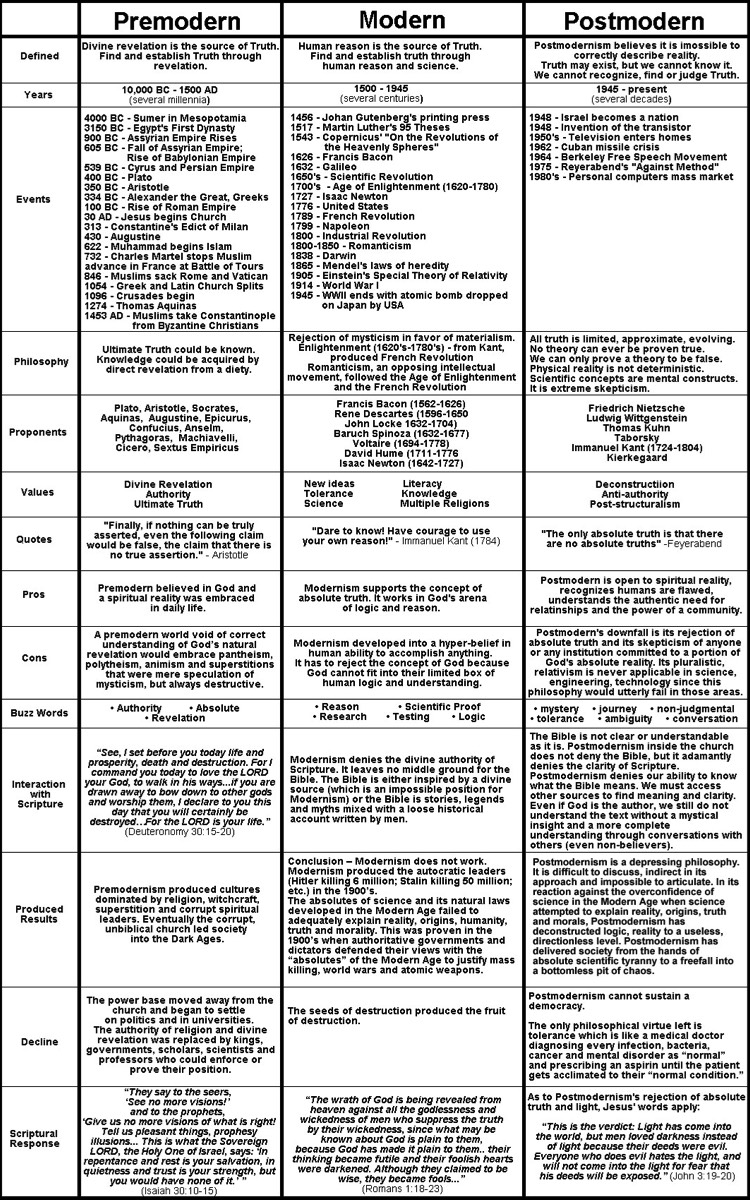
Paul and Philosophy
There are several places in the New Testament where Paul addressed the topic of philosophy and worldviews. In 60 AD Paul wrote a letter to the Church of Colosse. At the time, he was being detained in Rome for appearance in court before Emperor Nero. Paul warned the believers of the Colossian church not to confuse the “hollow and deceptive philosophy” of the world with the fullness of Christ.
So then, just as you received Christ Jesus as Lord, continue to live in him, rooted and built up in him, strengthened in the faith as you were taught, and overflowing with thankfulness. See to it that no one takes you captive through hollow and deceptive philosophy, which depends on human tradition and the basic principles of this world rather than on Christ. For in Christ all the fullness of the Deity lives in bodily form, and you have been given fullness in Christ, who is the head over every power and authority. (Colossians 2:6-10)
In contrast to “hollow and deceptive philosophy”, Christ himself is described as the “fullness of Deity”. Paul presents Christ as the foundation upon which the Colossians should build their philosophy and worldview. The false philosophies are based on “human tradition and the basic principles of this world rather than on Christ”. I would like to present the “Fullness of Christ” in this illustration:
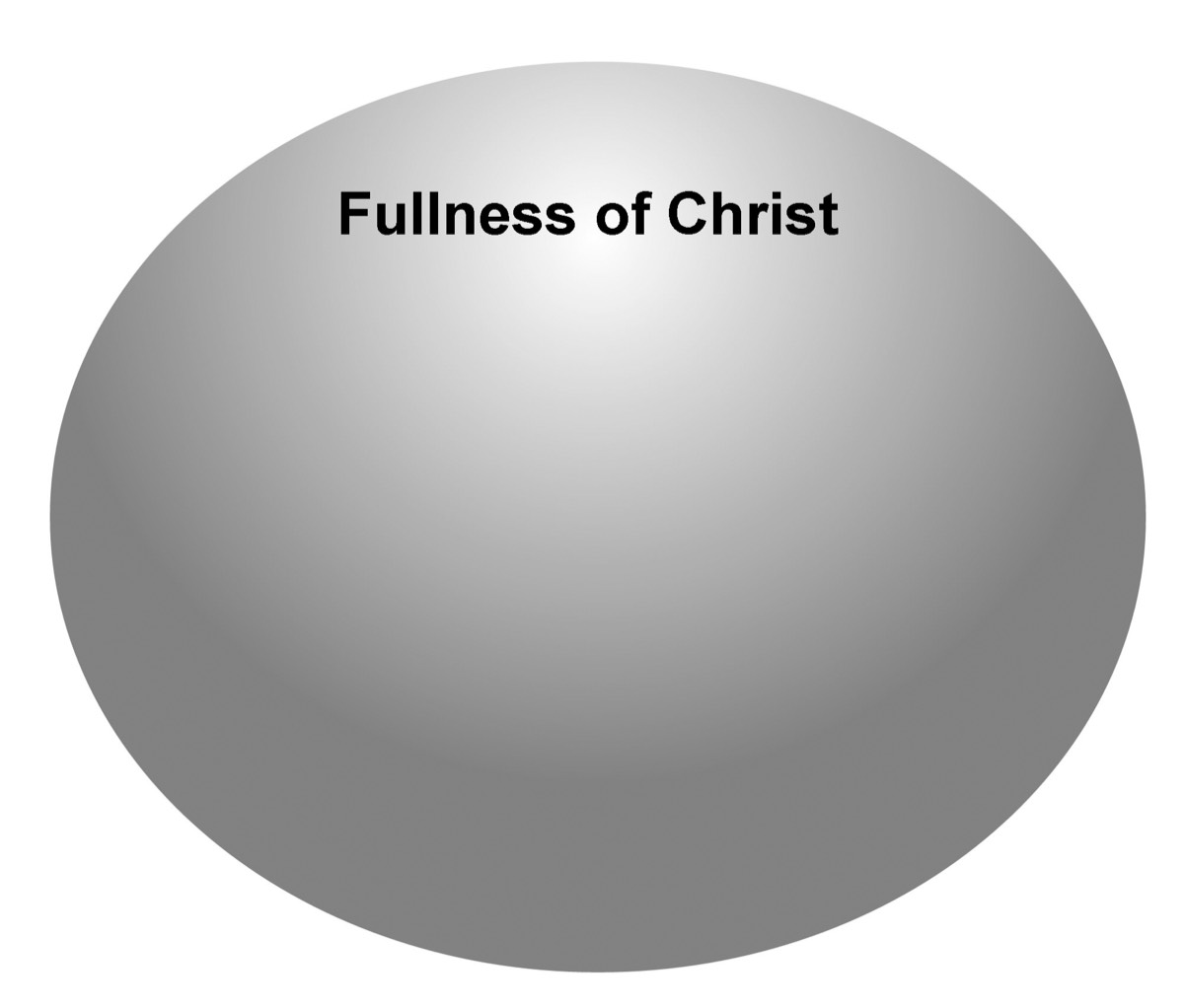
"Fullness of Christ" is the true philosophy.
Earlier in Colossians Paul had described Jesus Christ as “the image of the invisible God”. This description agrees with the rest of Scripture and gives a correct understanding of the Triune God. Jesus is the second member of the Trinity and is eternal God.
He is the image of the invisible God, the firstborn over all creation. (Colossians 1:15)
The words “the firstborn over all creation” does not mean that Jesus Christ was created, but emphasize his position in relationship to the created world as the supreme, rightful heir who rules “over all creation”. More on that later. Here is the next in my sequence of illustrations used to explain the true philosophy of “the fullness of Christ” in contrast to the hollow philosophies that are idol worship:
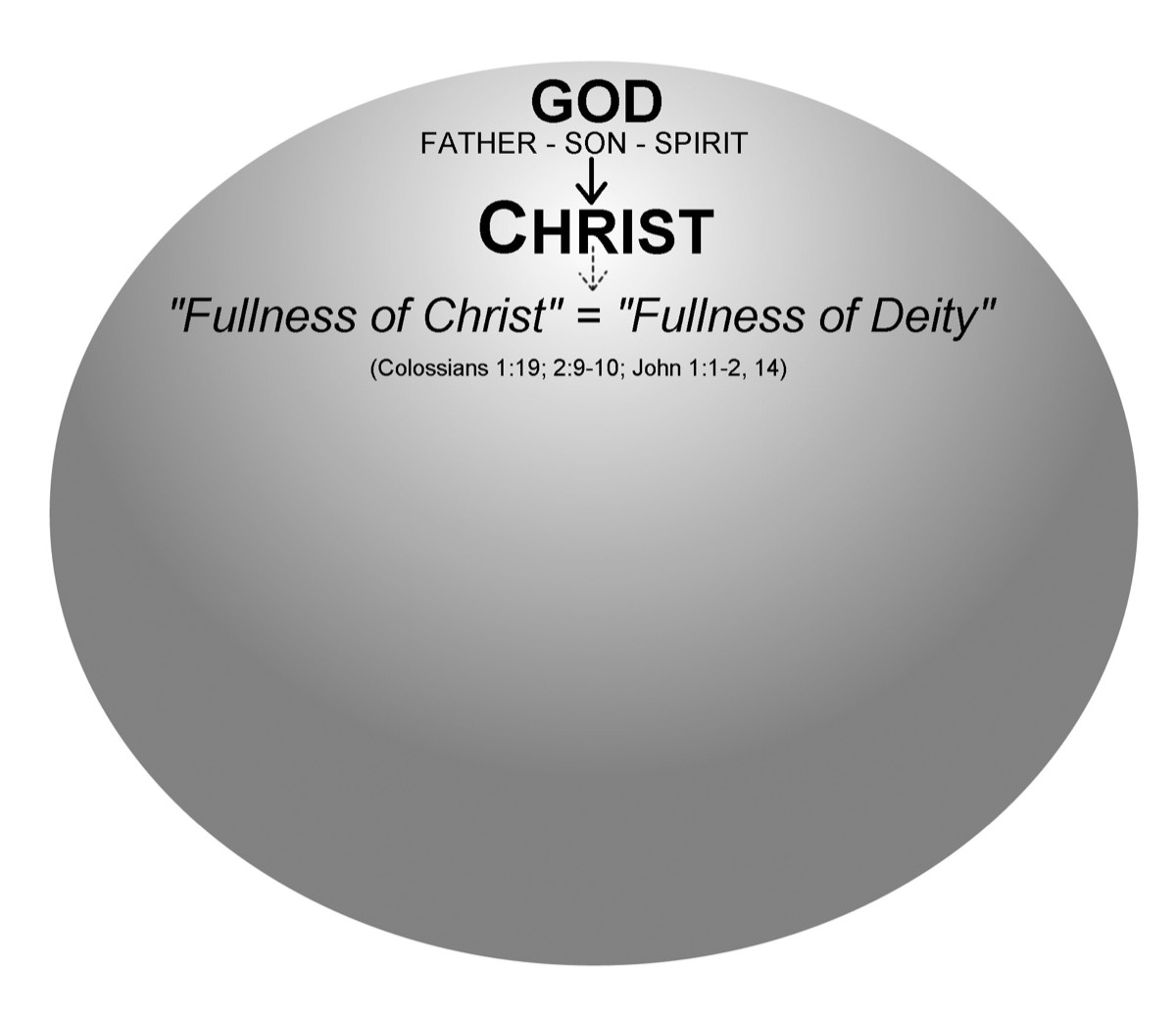
All of creation will come from and through Christ.
It was Christ, the eternal Son of God, who was the author of creation. Created reality came into existence from Christ’s “fullness of Deity”.
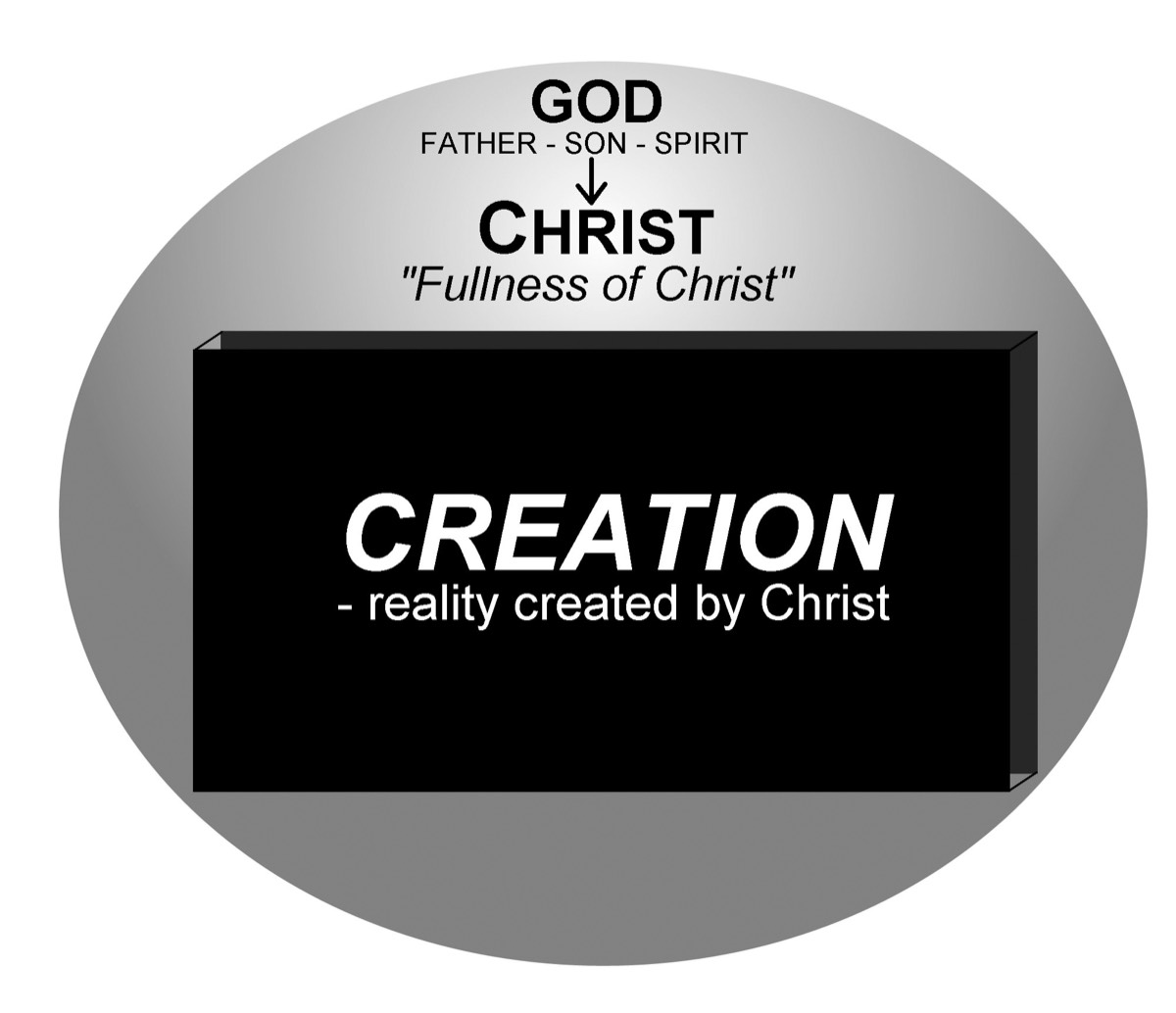
Creation came from Christ and demonstrates the glory of Christ, but creation cannot contain Christ.
All that Christ is cannot be adequately expressed by creation.
All of creation is in Christ. Jesus Christ is the fullness of Deity.
Notice that God, Christ and the “fullness of Christ” are outside of the box of creation. Creation reflects the Creator, but does not contain the fullness of the Creator. Creation cannot encompass the fullness of Christ who is himself the fullness of Deity. Creation clearly reveals the invisible qualities and the divine characteristics of God, but creation itself does not fully possess, communicate or understand the surpassing eternal nature of God or the “fullness of Christ.” This means that creation can reveal certain aspects of God, but the creation cannot reveal all that is God. Christ can contain all of creation, but creation cannot contain all of Christ.
Creation can exist and find the fullness of its being in God, but God cannot exist in his fullness in creation.
The heavens declare God’s glory and reveal God’s knowledge:
The heavens declare the glory of God, and the sky above proclaims his handiwork. Day to day pours out speech, and night to night reveals knowledge. There is no speech, nor are there words, whose voice is not heard.
Their voice goes out through all the earth,
and their words to the end of the world. (Psalm 19:1-4)
But, creation cannot contain God:
But will God really dwell on earth? The heavens, even the highest heaven, cannot contain you. How much less this temple I have built! (1 Kings 8:27)
The heavens, even the highest heavens, cannot contain him.
(2 Chronicles 2:6 and 6:18)
God cannot be reduced to a temple built by human hands and cannot be limited by a human ideology. We, as creatures made by God, live our full lives in God. We cannot move anywhere in time or space that will be outside of God. Our entire being (spirit, soul and body) is always in God. This is the “fullness of Christ” in which we exist. This same “fullness of Christ”, though, cannot be confined or reduced to a place, a portion, or a time in creation:
The God who made the world and everything in it is the Lord of heaven and earth and does not live in temples built by hands… ‘For in him we live and move and have our being.’ (Acts 17:24-28)
As a side note, this “fullness of Christ” or the “fullness of deity” did exist bodily in the man Jesus Christ according to:
- Colossians 2:9, “For in Christ all the fullness of the Deity lives in bodily form.”
- John 1:1-2, 14, “In the beginning was the Word, and the Word was with God, and the Word was God. He was with God in the beginning…The Word became flesh and made his dwelling among us. We have seen his glory, the glory of the One and Only, who came from the Father, full of grace and truth.”
- Colossians 1:19, “For God was pleased to have all his fullness dwell in him…”
Creation includes the physical universe, but much more as well. When we speak of the things that Christ created we are speaking of both the material and immaterial parts, of visible and invisible things, of physical and spiritual beings. Creation includes:
- Angelic beings
- Concepts of time and gravity
- All of material space
- Mental concepts and the soul of man
- Mountains, rivers and seas
- Birds, animals and man
- Sky, stars and galaxies
He is the image of the invisible God, the firstborn over all creation. For by him all things were created; things in heaven and on earth, visible and invisible, whether thrones or powers or rulers or authorities; all things were created by him and for him. He is before all things, and in him all things hold together. (Colossians 1:15-16)
It can be shown like this:
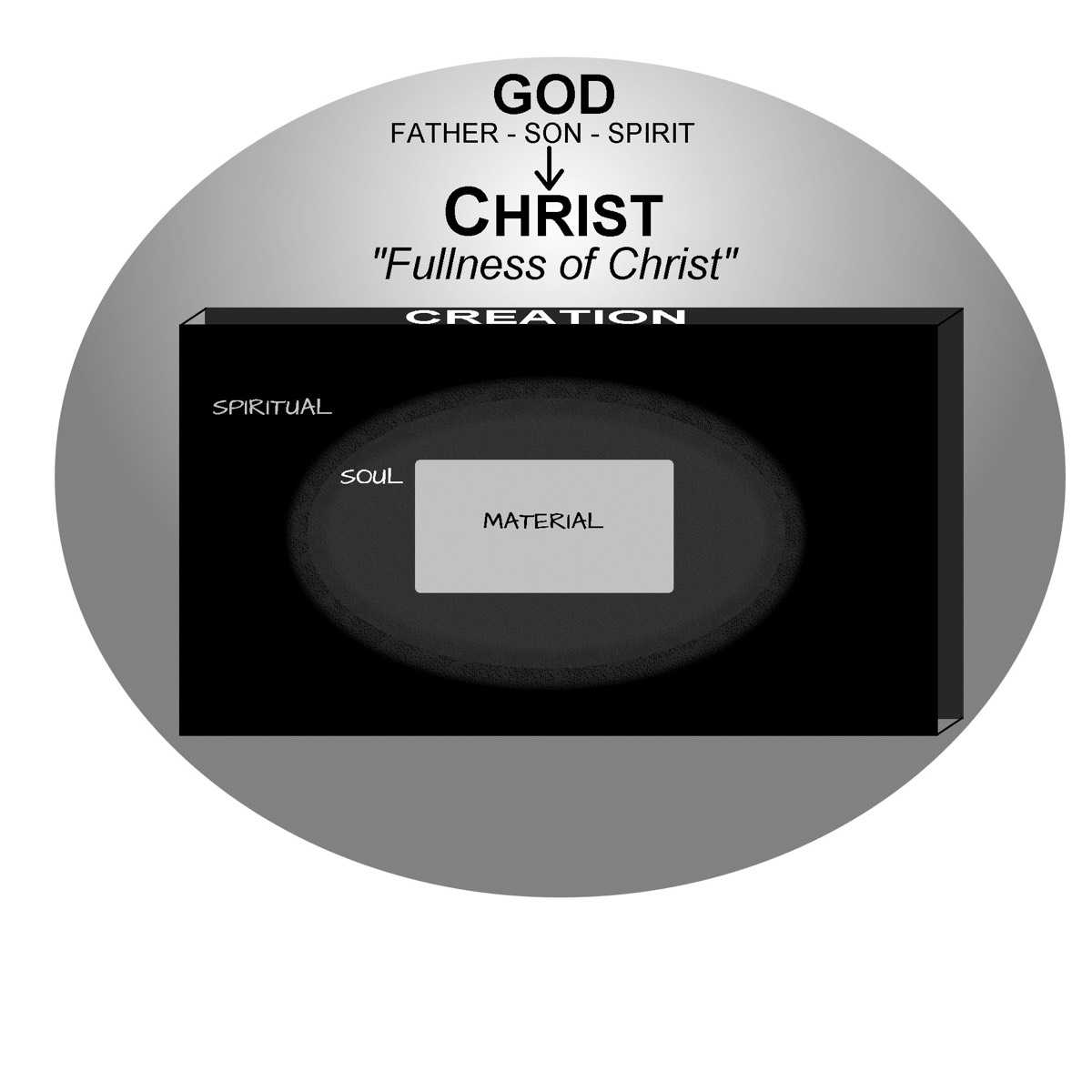
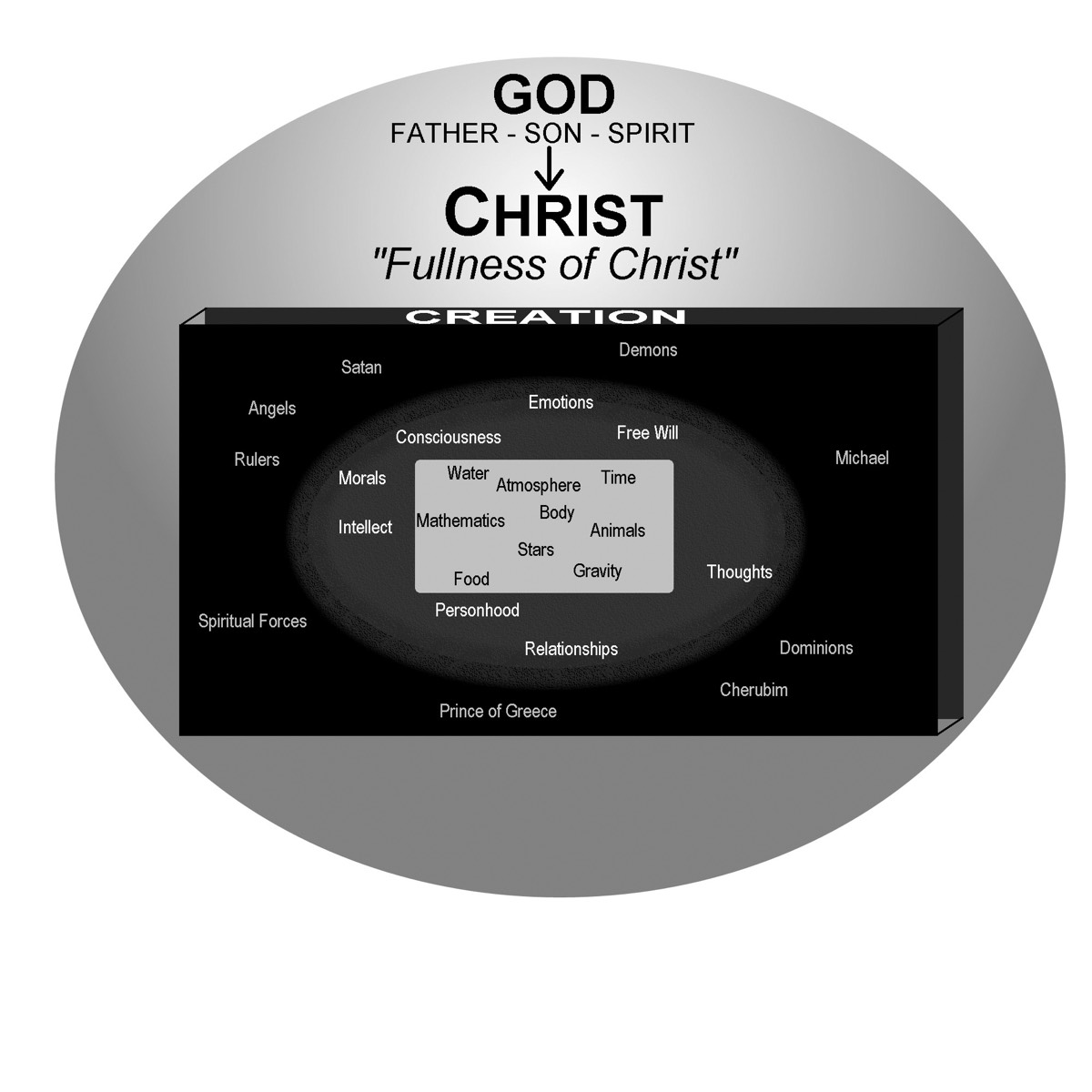
What can be known about God is plain to them, because God has shown it to them. For his invisible attributes, namely, his eternal power and divine nature, have been clearly perceived, ever since the creation of the world, in the things that have been made. So they are without excuse. For although they knew God, they did not honor him as God or give thanks to him, but they became futile in their thinking, and their foolish hearts were darkened. Claiming to be wise, they became fools, and exchanged the glory of the immortal God for images resembling mortal man and birds and animals and creeping things. Therefore God gave them up in the lusts of their hearts to impurity, to the dishonoring of their bodies among themselves, because they exchanged the truth about God for a lie and worshiped and served the creature rather than the Creator, who is blessed forever! Amen. For this reason God gave them up to dishonorable passions. For their women exchanged natural relations for those that are contrary to nature; and the men likewise gave up natural relations with women and were consumed with passion for one another, men committing shameless acts with men and receiving in themselves the due penalty for their error. And since they did not see fit to acknowledge God, God gave them up to a debased mind to do what ought not to be done. They were filled with all manner of unrighteousness, evil, covetousness, malice. They are full of envy, murder, strife, deceit, maliciousness. They are gossips, slanderers, haters of God, insolent, haughty, boastful, inventors of evil, disobedient to parents, foolish, faithless, heartless, ruthless. Though they know God's righteous decree that those who practice such things deserve to die, they not only do them but give approval to those who practice them. (Romans 1:19-32)
Romans 1:19-20 supports the illustrations presented above concerning God’s creation revealing his nature, but not containing God. The things in creation give man evidence of God’s existence and God’s nature. This is not only revealed to people in Christian nations or believers in church, but all people everywhere at all times.
What can be known about God is plain to them, because God has shown it to them. For his invisible attributes, namely, his eternal power and divine nature, have been clearly perceived, ever since the creation of the world, in the things that have been made. So they are without excuse. (Romans 1:19-20)
An article in American Psychological Association from December 2010 states some modern research that supports Paul’s assertion:
A common thread to those cognitions is that they lead us to see the world as a place with an intentional design, created by someone or something. Young children, for example, tend to believe that even trivial aspects of the natural world were created with purpose, according to a series of studies by Boston University psychologist Deborah Keleman, PhD. If you ask children why a group of rocks are pointy, for example, they say something like, “It’s so that animals won’t sit on them and break them.” If you ask them why rivers exist, they say it’s so we can go fishing. Adults also tend to search for meaning, particularly during times of uncertainty, research suggests. A 2008 study in Science (Vol. 322, No. 5898) by Jennifer Whitson, PhD, and Adam Galinsky, PhD, found that people were more likely to see patterns in a random display of dots if the researchers first primed them to feel that the participants had no control. This finding suggests that people are primed to see signs and patterns in the world around them, the researchers conclude. People also have a bias for believing in the supernatural, says Barrett. In his work, he finds that children as young as age 3 naturally attribute supernatural abilities and immortality to “God,” even if they’ve never been taught about God…“What we’re showing is that our basic cognitive equipment biases us toward certain kinds of thinking and leads to thinking about a pre-life, an afterlife, gods, invisible beings that are doing things — themes common to most of the world’s religions,” says Barrett…this tendency also set us up to believe in an omnipresent God-like concept. Taken together, it’s easy to see how these cognitive tendencies could allow our minds to create religions built on the idea of supernatural beings that watch over our lives, says Atran, director of research at the Centre National de la Recherche Scientifique in Paris. Such research also supports the notion that religious thought is in many ways an unavoidable byproduct of the way our minds work. …“We’ve had this long history of believing that the things of the spirit are in one camp and that science and technology are in another camp,” says Plante, professor and director of the Spirituality and Health Institute at Santa Clara University and president of APA’s Div. 36 (Psychology of Religion). “If anything, this work reiterates that we are whole people; the biological, psychological, social, cultural and spiritual are all connected.
In another article from November of 2008 Martin Beckford, Religious Affairs Correspondent for The Telegraph wrote the following:
Children are ‘born believers’ in God and do not simply acquire religious beliefs through indoctrination, according to an academic. Dr. Justin Barrett, a senior researcher at the University of Oxford's Centre for Anthropology and Mind, claims that young people have a predisposition to believe in a supreme being because they assume that everything in the world was created with a purpose. He says that young children have faith even when they have not been taught about it by family or at school, and argues that even those raised alone on a desert island would come to believe in God. ‘The preponderance of scientific evidence for the past 10 years or so has shown that a lot more seems to be built into the natural development of children's minds than we once thought, including a predisposition to see the natural world as designed and purposeful and that some kind of intelligent being is behind that purpose,’ he told BBC Radio 4's Today programme. ‘If we threw a handful on an island and they raised themselves I think they would believe in God.’ … Dr. Barrett will cite psychological experiments carried out on children that he says show they instinctively believe that almost everything has been designed with a specific purpose. In one study, six and seven-year-olds who were asked why the first bird existed replied ‘to make nice music’ and ‘because it makes the world look nice’. Another experiment on 12-month-old babies suggested that they were surprised by a film in which a rolling ball apparently created a neat stack of blocks from a disordered heap. Dr. Barrett said there is evidence that even by the age of four, children understand that although some objects are made by humans, the natural world is different. He added that this means children are more likely to believe in creationism rather than evolution, despite what they may be told by parents or teachers. Dr. Barrett claimed anthropologists have found that in some cultures children believe in God even when religious teachings are withheld from them. ‘Children's normally and naturally developing minds make them prone to believe in divine creation and intelligent design. In contrast, evolution is unnatural for human minds; relatively difficult to believe.’ ” (underlining and bold type are mine)
After claiming that evidence for God’s existence is visible in God’s creation Paul states the problem, which is men themselves and their false philosophies. Men purposely exchange the glorious revelation that God has provided of himself and his character for things that exist within creation itself. So, instead of seeing God clearly through his creation, men choose to see only part of the created world and then adjust their worldviews and develop philosophies to fit that portion of creation they have chosen to focus on.
Now, whichever part of creation man chooses to focus on and build his philosophy around is itself a creation of God, and so is in itself “good” (as identified in Genesis 1:31, “God saw all that he had made, and it was very good.”) It was created by God to reflect God and his nature. It is true and right, and a useful reflection of God by design. The problem comes when man tries to explain everything else in creation - including the glorious Creator himself - through that small part of the creation, because no matter how “very good” the favored part of creation selected by man is, it does not have the ability to replace the Creator or the “fullness of Christ.”
Therefore, that man’s worldview is going to be deficient. It cannot be otherwise. If the good thing designed to reveal the Creator is used in the wrong way (i.e., as the foundation upon which man will explain everything) it will lead to disastrous results, since it does not have the capacity to rightly explain other parts of creation. So, the rest of creation will be misrepresented, misunderstood, misused, and messed up by man. This is especially true when that selected thing will be required to compete with the fullness of Christ. Since, the creation cannot handle the “fullness of Christ”, creation will have to suppress the Creator and oppress other equally real parts of creation that cannot be explained. Paul explains it like this in Romans 1:21-23:
For although they knew God, they did not honor him as God or give thanks to him, but they became futile in their thinking, and their foolish hearts were darkened. Claiming to be wise, they became fools, and exchanged the glory of the immortal God for images resembling mortal man and birds and animals and creeping things. (Romans 1:21-23)
“They became futile in their thinking” when they replaced the “fullness of Christ” (“the glory of the immortal God”) with a portion of the created world (“images” to represent the strength and glory of “mortal man” or a flying “bird” or a powerful “animal” and ultimately declining even to bugs.)
The result of this suppression of the “fullness of Christ” and the following of “hollow and deceptive philosophies” (Colossians 2:6-10) results in oppression and philosophical deconstruction. In Colossians Paul says that these “hollow and deceptive philosophies” which replace Christ are dependent on “human tradition and the basic principles of this world.” Creation and the creature (including man himself) become less than God intended because they are now fulfilling a baser function than what God intended when he created them and identified them as “very good”. This lowering of our own humanity and dragging creation with us to a base level is what Paul refers to next, in Romans 1:24-29. In these verses Paul identifies the false philosophies that ultimately dehumanize mankind:
Therefore God gave them up in the lusts of their hearts to impurity, to the dishonoring of their bodies among themselves, because they exchanged the truth about God for a lie and worshiped and served the creature rather than the Creator, who is blessed forever! Amen. For this reason God gave them up to dishonorable passions. For their women exchanged natural relations for those that are contrary to nature; and the men likewise gave up natural relations with women and were consumed with passion for one another, men committing shameless acts with men and receiving in themselves the due penalty for their error. And since they did not see fit to acknowledge God, God gave them up to a debased mind to do what ought not to be done. They were filled with all manner of unrighteousness… (Romans 1:24-29)
Since man built his philosophy (“worshiped and served”) around a part of creation (“the creature”) rather than the “fullness of Christ” (“the Creator”), man dehumanized himself below God’s intended “very good” purpose and deconstructed his world with his “debased mind”. In this dehumanized condition, with God’s reality deconstructed all around him, man is left to organize his world with a philosophy that can only produce the characteristics described in Romans 1:29-31:
- Unrighteousness
- Evil
- Covetousness
- Malice
- Envy
- Murder
- Strife
- Deceit
- Maliciousness
- Gossip
- Slander
- Hatred of God
- Insolence
- Haughtiness
- Boasting
- Inventing of evil
- Disobedience to parents
- Foolishness
- Faithlessness
- Heartlessness
- Ruthlessness
To compensate for their rejection of Truth, people must create a “truth” (that is, an alternate to Truth). However, any alternate truth would actually be a lie. Thus, any philosophy that runs counter to the “fullness of Christ” is:
- Only partial Fullness
- Deviation from Reality
- A twisting of Truth
- A cause of confusion within Creation
- An accusation of deception in the Word of God
Any philosophy or worldview that is in rebellion toward God’s Fullness, Reality, Truth, Creation, and Word is going to be insufficient for the creature (man) to adequately interact with his world - the world that was created by Christ. Every false philosophy will create some form of deficiency that results ultimately in dysfunction, disappointment, destruction and, death.
Romans 1:32 says the people who follow these false philosophies, or idols, know that such vile behavior deserves punishment and death, but far from turning away from it they give approval to others who do the same things. Apparently, they hope to win the spiritual battle by forming a majority that together can hide the light of truth and reality:
Though they know God’s righteous decree that those who practice such things deserve to die, they not only do them, but give approval to those who practice them. (Romans 1:32)
In order to live a normal life in Christ’s creation, the man who rejects the “fullness of Christ” must balance himself within creation by embracing a philosophy that brings harmony to his daily life by assuming an alternate reality. The man who follows an idol has in, some form, deified a portion of creation. The idol worshipper, or the follower of a false philosophy, has exalted a part of the created Reality to the status of god. This same man must create a philosophy (worldview) by shaping truth and reality to match his favored part of creation. The aligning of “truth” and “reality” to the deified part of creation becomes the false philosophy that balances the unbeliever’s life.
In this scenario there will always be conflict with the Creation, with the Truth, and with the Reality that originates from the “fullness of Christ”. The subjects of these philosophical conflicts will be suppressed or deconstructed so they do not interfere with idolater’s false philosophy. This process is called reductionism because it reduces reality to make it fit into the idolater’s box. But, not everything in Christ’s Creation fits into the box created by an idolater’s false philosophy. Since idolatry is limited in its thinking, it must imprison or suppress some portion of the “fullness of Christ” that is reflected in creation, or the false philosophy will quickly fall apart.
Some examples of recent idols and their philosophy include:
- Nazism – the idol taken from creation was race
- Communism – the idol taken from creation was economics
- Atheism – the idol taken from creation was human reason
- Materialism – the idol is created matter
In all these cases the part of creation that was chosen in place of the “fullness of Christ” was something Christ had created and originally called “very good.” But, when the created part is separated from Christ and used as the source of origin, purpose, ethics, and future destination, it becomes “very bad”. In order to make the false reality work, the false philosophy naturally begins to deconstruct the Creator’s Truth and Reality. However, this deconstruction will eventually cause a person to live in a way that is dishonoring to God’s intention for them and destructive to other people, things, relationships, circumstances, etc.
The situation can be illustrated like this: Materialism is an attempt to explain everything by one aspect of creation: the physical world. In the philosophy of materialism everything is explained by physical realities and processes - including all human behavior, which is reduced to merely the result of physical chemical reactions in the brain. So, based on this view, the idol of materialism must reject the soul, the spiritual dimension, and Christ himself. This is necessary if the idolater’s truth and reality are going to match its idol of Materialism.
God declared that material was “very good” in Genesis, but that only remains true if the material is left in its context as a created thing which finds its fullness in the “fullness of Christ”. But, if the glory of the Creator is to be limited by a materialistic definition then there is going to be conflict in the realm of reality and truth, because there are going to be some things that materialism cannot explain with its limited “fullness of materialism” philosophy.
For example, how can the false idol of materialism explain how material itself can be the original source of the existence of the material world? In that case the existence of an original material will have to be used as the explanation, to replace the concept of the original creation of material ex nihilo (out of nothing) by an eternal spiritual being. And, if there is an eternal spiritual being that is the cause of creation ex nihilo, how could a man who honors the idol of materialism understand the Creator’s intended glory for any of the things created, but especially non-material things such as free will, moral choices, emotions, relationships, etc.? These things are too big for that idol’s box. They can only find their fulfillment in the “fullness of Christ”.
The illustration below shows what the idol of materialism needs to do to make sense of truth and reality created by Christ.
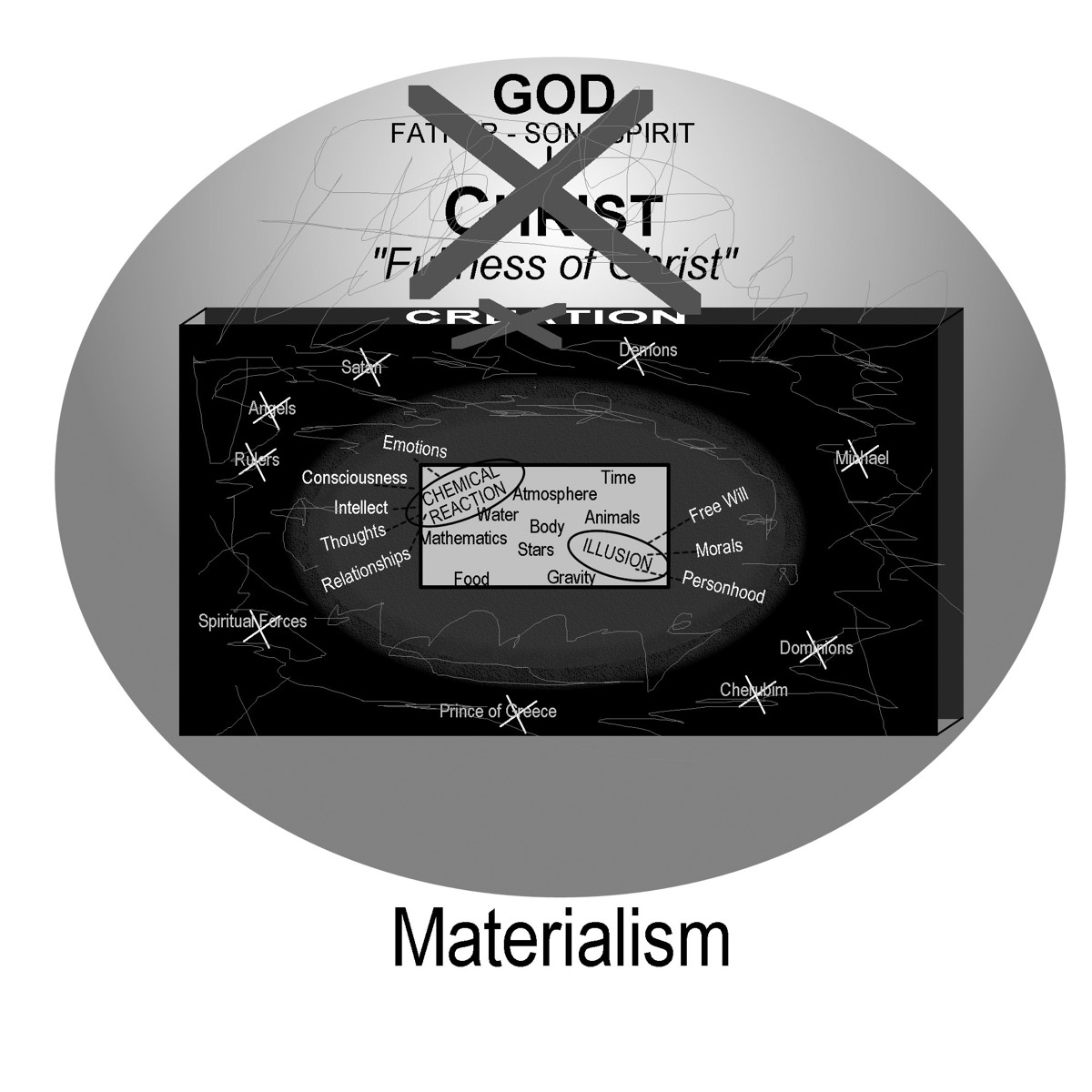
According to materialism our decisions are based merely on a chemical reaction or our perception of an illusion, the outcome produced in the physical world. There is no right or wrong. Nothing is true or false. And, this would include your views on philosophy, including the philosophy based on materialism. This idol cannot defend itself in a reasonable battle of wits with the “fullness of Christ.”
C.S. Lewis sees through this fog when he says in The Weight of Glory:
If, on the other hand, I swallow the scientific cosmology as a whole, then not only can I not fit in Christianity, but I cannot even fit in science. If minds are wholly dependent on brains and brains on biochemistry, and biochemistry (in the long run) on the meaningless flux of the atoms, I cannot understand how the thought of those minds should have any more significance than the sound of the wind in the trees. “The Weight of Glory”, page 139; source
We need to see the world, reality and other people within the framework of the “fullness of
Christ”, and not evaluate someone, something, some thought or any aspect of the created world outside the “fullness of Christ.” It is idolatry to try to place all thoughts and things (visible and invisible) into any philosophy that is not rooted in the “fullness of Christ”. The box of creation (visible and invisible) can only be understood in its correct context (which is “very good” according to the Creation account in Genesis 1:31) when it is understood as part of the philosophy based on “the fullness of Christ.”
All idolatry (false philosophies) reduces its own philosophical view to an unreasonable level. All idolatry logically defeats itself intellectually, and historically, it destroys its worshippers. By the very nature of idolatry, the followers of a false philosophy will be destroyed by any faithful application of that philosophy in the real world.
Rationalism (1543-present)
Rationalism acknowledges the existence of innate knowledge such as mathematical shapes and concepts, moral concepts, the idea of God, perfection, eternity and the knowledge of personal existence. Rationalists would say these things are true, not because we know them or perceive them with our five senses, but because we can access this information through the process of reasoning. Rationalism is different from empiricism in that the understanding of morality (right and wrong) may be understood through reason, though not through experience. Rationalism describes humans as having an established human nature that is affected by more than our five senses. It says man has freedom to refuse to be manipulated like a machine or trained like an animal, which empiricism claims is the only way man responds.
Rationalism agrees with God’s revelation in the fact that the Creation does have rationally knowable structure, which includes the human mind that has both structure and reasoning ability. But, Rationalism fails when our human reasoning doesn’t match reality when tested in the physical world. For example, Aristotle reasoned that a heavier object would fall to the earth faster than a lighter object, but Galileo showed through demonstration that this was not true. Intellectual reasoning and rational knowledge can be wrong and misrepresent the true physical world (not mention how wrong it can be about the spiritual world).
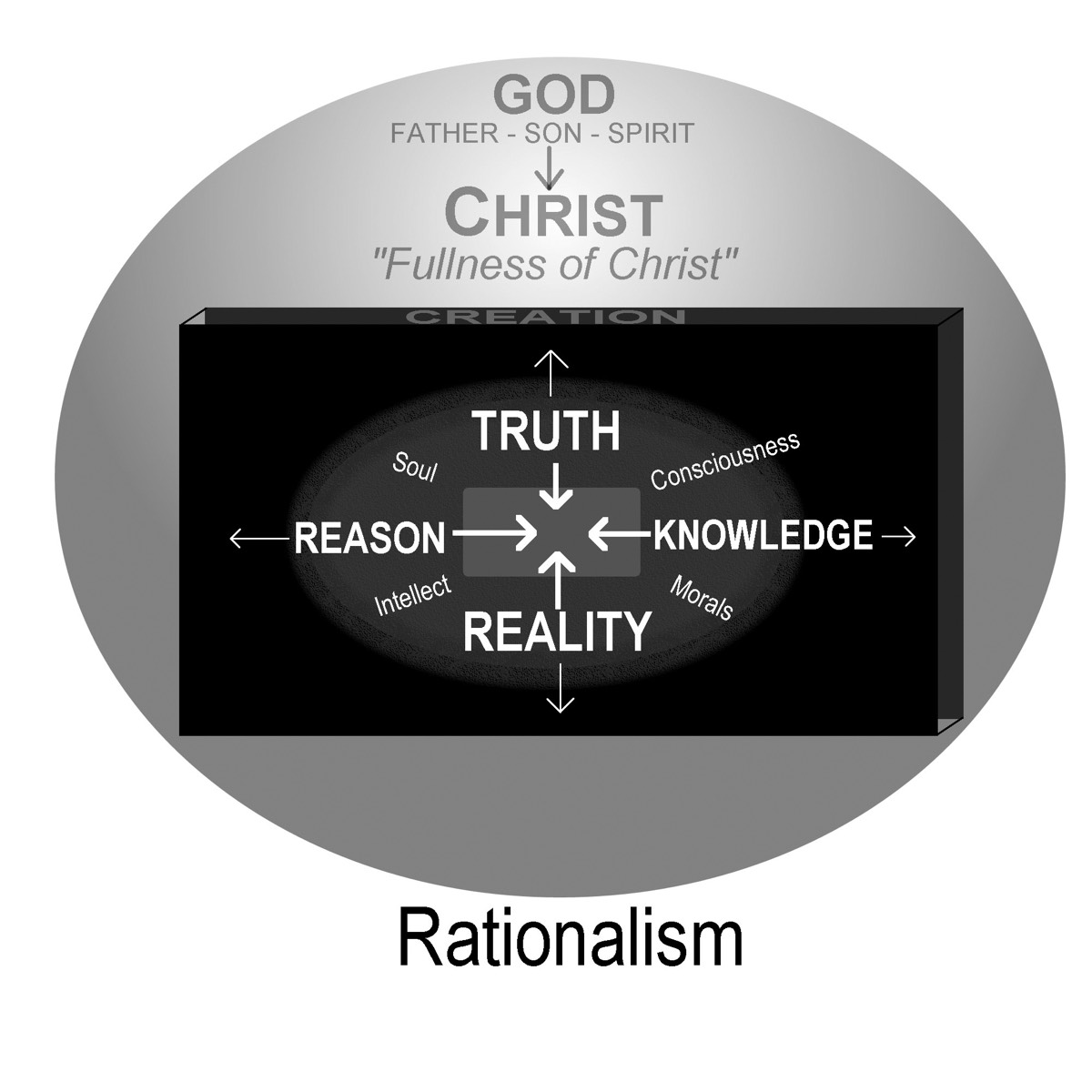
Empiricism (1600-1799)
Another example that illustrates the vanity of idolatry and the dead end of a false philosophy, can be seen in the philosophical theory of empiricism. Rising out of the 1600-1700’s was a theory which stated that all knowledge comes from sense experience. The philosophical view of empiricism holds that there is no such thing as innate knowledge. Anything we know must come through the five senses or be developed through the process of combining two or more sensual experiences by reasoning in the mind. Empiricism’s most famous argument is formed in the question, “How would you know what the color blue looks like if you were born blind?” The point the empiricist makes is that you must learn “blue” through your sense of sight. Without that sense you could not possibly obtain any knowledge of blue. Empiricists argue that reason is not the only way to obtain knowledge; in fact, the empiricist would use examples from history where reason was proven wrong once experience with the subject matter took place.
Empiricism does agree with God’s physical creation in acknowledging that it can be experienced with the five senses. Jesus was not afraid to appeal to man’s rational reasoning ability, but if that failed to stimulate understanding and faith, Jesus appealed to his crowd’s senses concerning the evidence they perceived from the world around them. In the verses below, Jesus uses both rationalism and empiricism as sources of knowledge, even revelation knowledge:
Do you not believe that I am in the Father and the Father is in me? The words that I say to you I do not speak on my own authority, but the Father who dwells in me does his works. Believe me that I am in the Father and the Father is in me, or else believe on account of the works themselves. (John 14:10-11)
Which is easier, to say to the paralytic, ‘Your sins are forgiven,’ or to say, ‘Rise, take up your bed and walk’? But that you may know that the Son of Man has authority on earth to forgive sins—he said to the paralytic— ‘I say to you, rise, pick up your bed, and go home.’ And he rose and immediately picked up his bed and went out before them all, so that they were all amazed and glorified God, saying, ‘We never saw anything like this!’ (Mark 2:9-12)
Jesus used empirical evidence as well as argumentation steeped in rationalism. This is the case throughout Scripture, in both the Old and New Testaments.
The philosophical problem with empiricism is that it limits natural revelation and completely ignores special revelation.
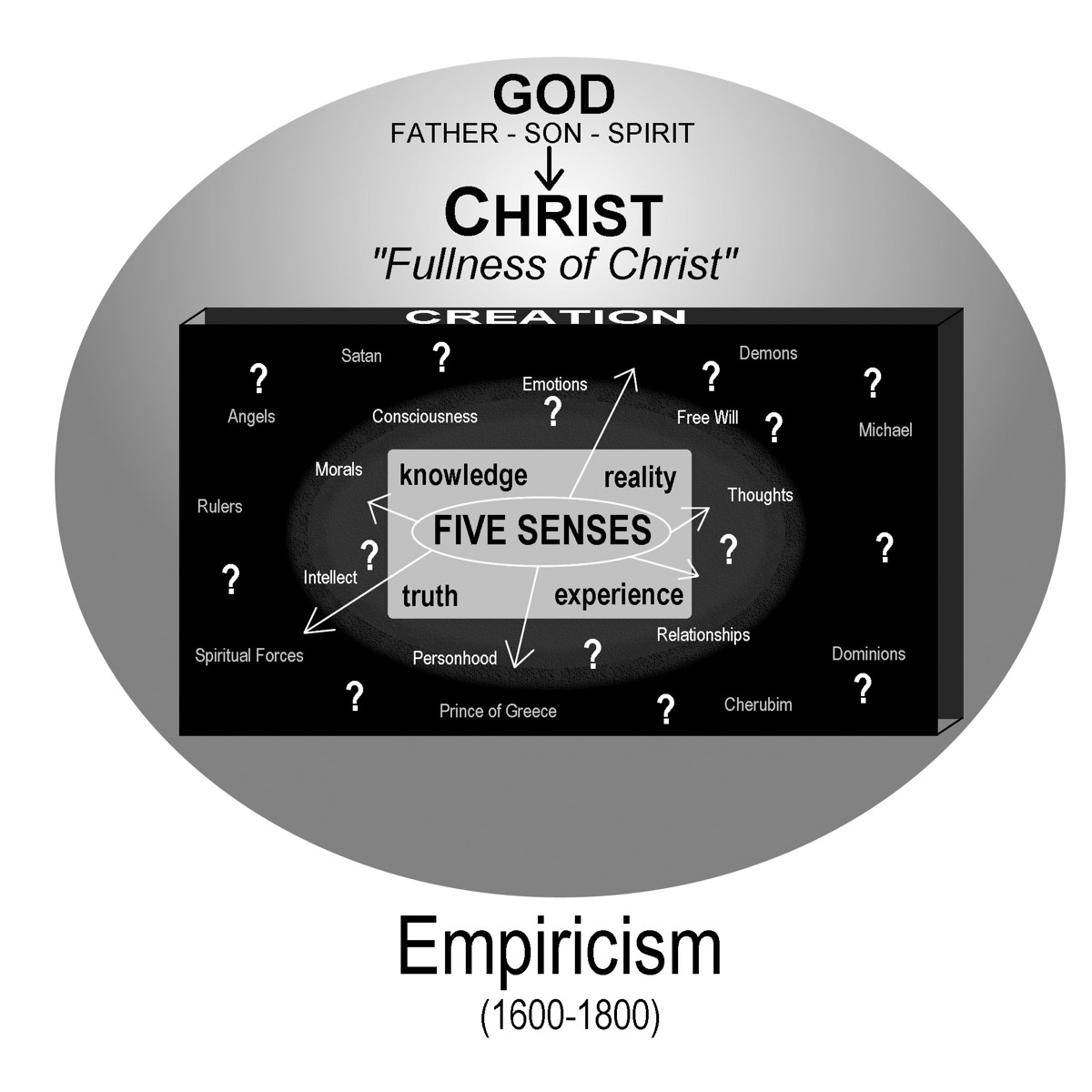
Romanticism
Romanticism was an intellectual movement that appeared between 1800-1850 in opposition to the worldviews coming from the Age of Enlightenment: Materialism, Rationalism, and Empiricism. The Enlightenment had created the impression that humans were mere machinery in an orderly physical world. In contrast, Romanticism embraced the free will of man and human creativity at a time when the Western world was witnessing the rise of the Industrial Revolution.
Once again, the world saw a portion of God’s created reality that it recognized, embraced, promoted and celebrated as the “fullness” of truth. But, as in the past, a “very good” part of God’s Creation was forced to the center and turned into the focal point of all reality. The truth of the human experience would now be limited to and explained by only emotion and intuition, excluding rationalism and reason. The “fullness of Christ” was rejected and replaced with individual imagination.
Just as the Age of Enlightenment had thrown off the bondage of superstition and the mysticism of misguided religion, the Romantics of this age rejected the shackles of natural law. Science and rationality were not honorable virtues when compared to the greater values of emotion, passion, individualism, imagination and the subjective creativity of the man freed from the restraints of the natural, mechanical, material world. Romanticism accepted a reality created by human choice and human will, instead of an ordered material world existing under the supervision of man. The art of this period focused on shipwrecks, uncontrolled cataclysmic extremes, and the uncontrolled power of nature.
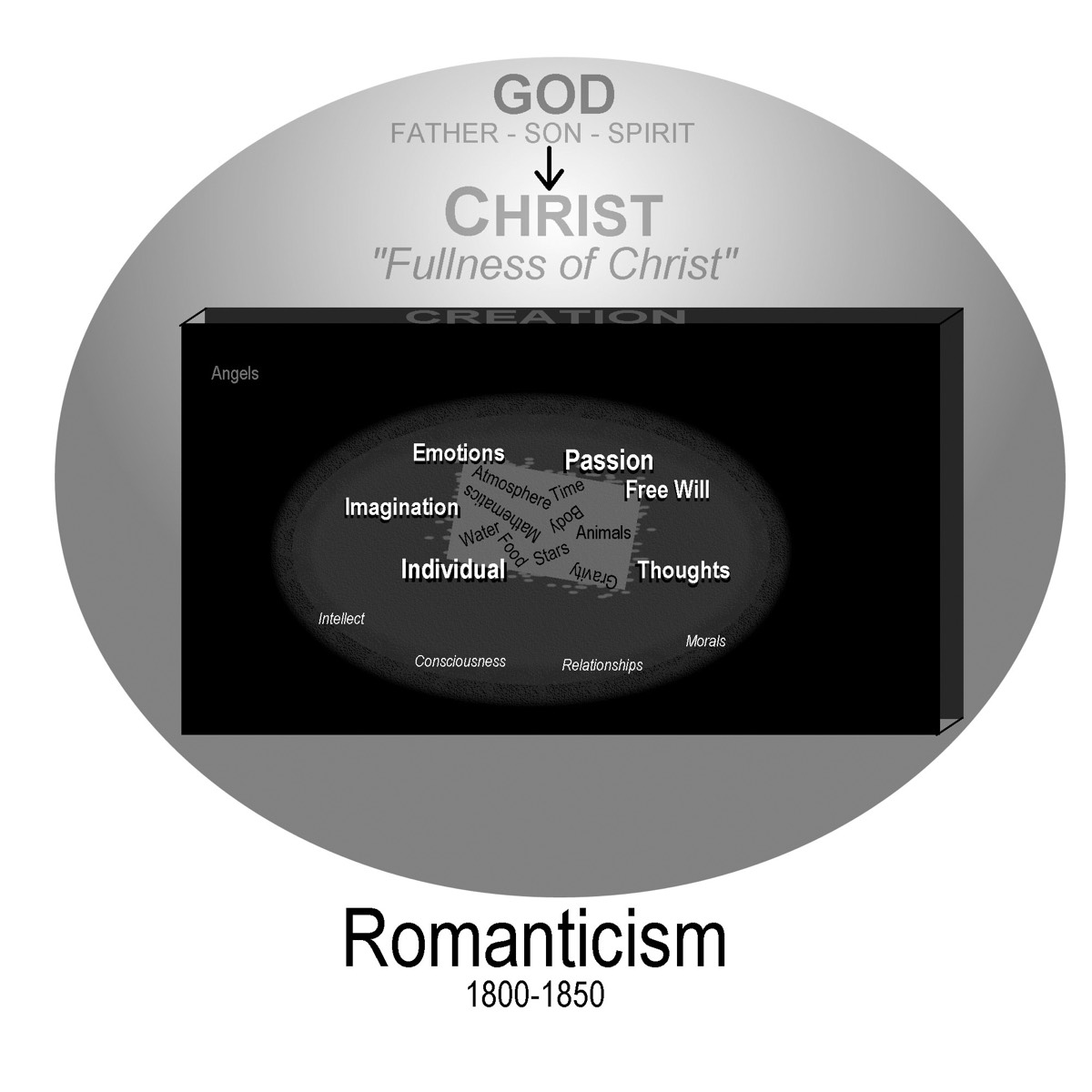
Paul’s Theology and Philosophy
Paul directly addressed the Greek philosophy that had entered into the Corinthian church when he wrote:
For it is written: ‘I will destroy the wisdom of the wise; the intelligence of the intelligent I will frustrate.’ Where is the wise person? Where is the teacher of the law? Where is the philosopher of this age? Has not God made foolish the wisdom of the world? For since in the wisdom of God the world through its wisdom did not know him, God was pleased through the foolishness of what was preached to save those who believe. (1 Corinthians 1:19-21)
Paul was not anti-intellectual. Instead, Paul sees intellect as being in the Creator. What Paul is against is trying to place Christ (the Creator) into an intellect. Intellect can discuss Christ, but intellect cannot exhaust Christ. Christ can both complete intellect and transcend its boundaries.
Paul goes on to say in 1 Corinthians 1:30-31 –
It is because of him that you are in Christ Jesus, who has become for us wisdom from God — that is, our righteousness, holiness and redemption. Therefore, as it is written: “Let the one who boasts boast in the Lord.”
Again, it is not that Paul was anti-intellectual or even anti-philosophical. Although Paul’s writings have been understood as anti-intellectual, anti-philosophical and, even anti-logic by early church fathers, modern believers, and atheistic philosophers. It appears that even Augustine began to lead the Church and the western world into the Dark Ages with this very misleading understanding of what Paul said.
Charles Freeman gets this point wrong in his excellent book, The Closing of the Western Mind, when he tries to explain Paul’s words to the Corinthians like this:
In his first letter to the Corinthians (1:25) he writes, ‘The wisdom of the world is foolishness to God.’ There is something of the mystic in Paul’s disregard of logic (and a paradox in the way he uses his considerable rhetorical skills to attack the very intellectual tradition of which rhetoric was part). This disregard had unfortunate consequences. As Paul’s writings came to be seen as authoritative, it became a mark of committed Christian to be able to reject rational thought, and even the evidence of empirical experience. Christians would often pride themselves on their lack of education, associating independent philosophical thinking with the sin of pride…By proposing that Christian faith (which exists in the world of muthos) might contain ‘truths’ superior to those achieved by rational argument (logoi) it was Paul, perhaps unwittingly in that he appears to have known virtually nothing of the Greek philosophical tradition he condemned, who declared the war and prepared the battle field. (Freeman, Charles, “The Closing of the Western Mind: The Rise of Faith and the Fall of Reason”; First Vintage Books Edition, February 2005, page 120)
On the contrary, Paul was not dismissing logic, philosophy, reason or reality. Paul was not replacing facts with faith. Paul was condemning the world for having dismissed the fullness of logic and for accepting an incomplete philosophy. The world had misused reason in order to rearrange the facts to defend its various false realities. Paul was not anti-intellectual, but was putting the intellect of man in its proportionately proper position in discovering the fullness of Christ, the Creator. Paul still used mathematical facts and language skills. Paul still sailed at sea and traveled on the Roman road system. But, he saw Christ as the ultimate underlying personal force for these realities - a force that had to be in place and able to function under what would eventually be understood to be laws of nature and scientific principles. Nothing could be a clearer statement of Paul’s view of intellect and philosophy than Romans 1:19-20:
What may be known about God is plain . . . . for since the creation of the world God’s invisible qualities – his eternal power and divine nature – have been clearly seen, being understood from what has been made. . . .
So, Paul does not dismiss reality, but instead considers it to be part of God’s revelation of himself to man. There is undeniably room in the box labelled “Fullness of Christ” for reason, logic, scientific law, philosophy, intellect, and on and on and on. The problem comes when one of these two things happen (and, sometimes they happen at the same time):
- Man tries to fit the fullness of Christ into scientific law or some other aspect of the created world
- The fullness of scientific law, discovered and undiscovered, must fit into the fullness of Christ
- The fullness of Christ could never fit into scientific law which is itself limited to the material creation of Christ
- Man attempts to rearrange the created order (scientific law, human relations, government, morality, etc.) to reflect his own fallen nature:
- Into man’s own image, instead of the glory of God
- Into man’s own desires, instead of God’s plan
- Into man’s own will, instead of the will of God
The Philosophy of Islam
Islam rejects the Trinity and so rejects the divine character trait of love and personhood of God. Only God in three persons can share the personal attributes of love. As C. S. Lewis said:
All sorts of people are fond of repeating the Christian statement that ‘God is love,’ but they seem not to notice that the words ‘God is love’ have no real meaning unless God contains at least two persons. Love is something that one person has for another person. If God was a single person, then before the world was made, He was not love.
If it is said that God’s love presented God the need to create man in order to express his love, then that means God was not complete for all of eternity until man was created to meet God’s need. Does the phrase “God’s need” bother you? If this position were developed and held as doctrine it would have to be labeled as heretically in opposition to Scriptural teaching and thousands of years of Jewish and Christian understanding of God.
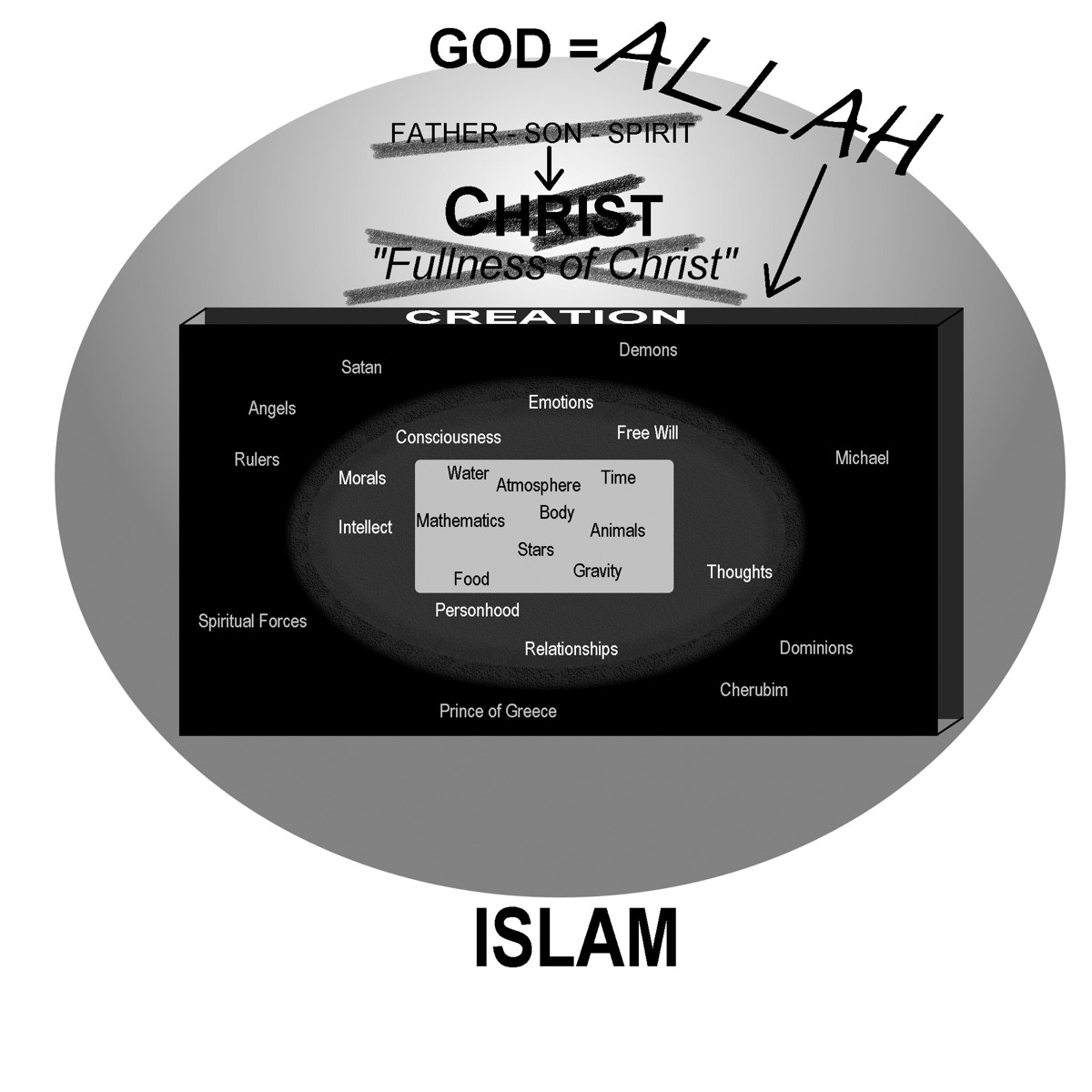
Godhead for all eternity follows logically from God’s nature of love and personhood. When the word “love” is used do not think of emotional love as much as you think of “1 Corinthians 13 love” (and, do not think of 1 Corinthians 13 as a wedding poem!). The love described in 1 Corinthians is a love that describes the selfless service and desire for unity of purpose among parts of a body working as one for a common goal. 1 Corinthians 13 is the center chapter of three chapters in which Paul talks to the Corinthian church about working together as an organization of people with spiritual gifts from God, the Trinity. 1 Corinthians 13 is preceded by chapter 12, where he defines spiritual gifts in the body of Christ, the Church. Chapter 14 then describes how the Church should function as a unified body empowered by the concept of love.
So, when Islam rejects the Trinity it also rejects the personhood of God, and in doing so, reduces God’s characteristic of personal love down to simple absolute dominion. This concept of God eliminates any ability for humans to have a free will response to God’s love and makes it impossible for humans to manifest the divine characteristic of love, since the Muslim deity (Allah) by definition does not have love. Nor, does Allah have personhood. This fact is manifested in the Muslim worshipper’s response to his god, because the only way man can respond to the absolute power of the Islamic deity is with submission.
In fact, as many know already, the Arabic word “islam” means “submission” or “surrender”. Thus, the way Islam manifests the nature of its god is as oppression by dominion. Muslims must reduce the fullness of Christ, the personhood of the Trinty, and the nature of the true Godhead into the false philosophy of the absolute fatalism of the Muslim’s unavoidable submission to Allah. Thus, the Muslim must dominate his world and conquer all life and people in any way possible, including the use of traps and deceit, lies and manipulation, war, intimidation and laws.
Muslims imitate the nature and character of their god by catching (aka, “converting”) men, like men trap animals. Muslim philosophy must force the “fullness of Christ” and his creation into its idolatrous box. Islam deconstructs anything that does not fit into the box by making it something less than Jesus Christ, the Creator and Second Member of the Trinity, intended. People created in the image of the Eternal God must become less than the personal God of love intended them to be. Women and children must be forced into obedient submission and used by men who reflect the philosophy of the false god they have submitted to.
Since the god of Islam has no personhood those who worship him cannot worship him in a personal relationship. Islamic worship is mechanical, and includes the repetitious recitation of the Koran by Muslim worshippers, who need not understand what they are saying, because the mere act of submission is all that this idolatrous philosophy can achieve. In Christianity, it is the understanding of the Truth that will renew a worshiper’s mind and empower him to discern right from wrong and fulfill God’s will in time and eternity. In Islam, however, even mindless recitation and mechanical ritual is the worship required to demonstrate adequate submission to the will of its god.
Yet, the worshippers of Allah were created by Jesus Christ, in the image of the Trinity, with personhood and capacity for love and a relationship with the true God. Sadly, the Islamic religion cannot handle the “fullness of Christ” and so Muslim worshippers must deconstruct the very Reality that Christ created them for.
As Paul prays in Ephesians 3:17-19:
And I pray that you, being rooted and established in love, may have power together with all the saints, to grasp how wide and long and high and deep is the love of Christ, and to know this love that surpasses knowledge that you may be filled to the measure of all the fullness of God. (Ephesians 3:17-19)
Many people have wrongly attempted to equate the word Islam with peace by showing that Islam, meaning 'submission', shares a root word with Salaam, meaning 'peace'. But if such relationships between the meanings of Arabic words can be created then that would imply that there is a relationship between one of the derivations of the infinitive Salama, meaning the stinging of the snake or tanning the leather, and Salam, meaning peace; a relationship which obviously does not exist.
The Compendium of Muslim Texts, compiled by the USC-MSA, the Muslim Students
Association at the University of Southern California, confirms this understanding:
Misconception 1 - Islam is “the religion of peace” because the Arabic word Islam is derived from the Arabic word “Al Salaam” which means peace.
- It might seem strange to think of this as a misconception, but in fact it is. The root word of Islam is "al-silm" which means "submission" or "surrender." It is understood to mean "submission to Allah." In spite of whatever noble intention has caused many a Muslim to claim that Islam is derived primarily from peace, this is not true. Allah says in the Qur'an (translated):
[2:136] Say (O Muslims): We believe in Allah and that which is revealed to us and that which was revealed to Abraham, and Ishmael, and Isaac, and Jacob, and the tribes, and that which Moses and Jesus received, and that which the prophets received from their Lord. We make no distinction between any of them, and to Him we have surrendered. [Arabic "Muslimoon"]
- A secondary root of Islam may be "Al-Salaam" (peace), however the text of the Qur'an makes it clear that Allah has clearly intended the focus of this way of life to be submission to Him. This entails submission to Him at all times, in times of peace, war, ease, or difficulty.
Conclusion
Within God's Reality there is enough evidence for God's existence for him to be recognized, pursued, and known by man. But, also within that Reality is the fact that patience, mercy, and the effort to reach out to man will eventually be removed. God's incredible attempt to surround us with the revelation of his eternal being through the apparent endlessness of space, the unfathomable concept of time, the limitlessness of the atomic world, the enormous mathematical precision of minuscule genetics, and on and on - through the unexplorable complexities of personhood and the spiritual dimensions will eventually come to an end.
If these concepts are suppressed by our false philosophies, all that is left is the dark hopelessness of the alternative. There is a point where God gives individuals and cultures over to the very philosophies that have been used by men to rebel against Truth by defining and explaining a reality that does not actually exist. These rebellious philosophies will be devoured in judgment when met face-to-face with the "fullness of Christ". The verses below explain God's method, and warn of the wrath that Truth and Reality will bring upon the empty philosophies of the world and those who have embraced them.
Romans 1:24, 26, 28 “God gave them up” is repeated three time in these verses.
Psalm 44:11“You gave us up to be devoured like sheep and have scattered us among the nations.”
Deuteronomy 32:20 “I will hide my face from them," he said, "and see what their end will be; for they are a perverse generation, children who are unfaithful.”
Amos 8:11"The days are coming," declares the Sovereign LORD, "when I will send a famine through the land— not a famine of food or a thirst for water, but a famine of hearing the words of the LORD.”
John 9:4“As long as it is day, we must do the works of him who sent me. Night is coming, when no one can work.”
Psalm 115:4 and 8 “But their idols are silver and gold, made by human hands… Those who make them will be like them, and so will all who trust in them.”
Psalm 135:15 “The idols of the nations are silver and gold, made by human hands.”
Ephesians 4:14“Then we will no longer be infants, tossed back and forth by the waves, and blown in their deceitful scheming. Instead, speaking the truth in love, we will grow to become here and there by every wind of teaching and by the cunning and craftiness of people in every respect the mature body of him who is the head, that is, Christ.”
Colossians 2:8“See to it that no one takes you captive through hollow and deceptive philosophy, which depends on human tradition and the elemental spiritual forces of this world rather than on Christ.”
Proverbs 1:24-32“Since you rejected me when I called and no one gave heed when I stretched out my hand, since you ignored all my advice and would not accept my rebuke, I in turn will laugh at your disaster; I will mock when calamity overtakes you -- when calamity overtakes you like a storm, when disaster sweeps over you like a whirlwind, when distress and trouble overwhelm you. Then they will call to me but I will not answer; they will look for me but will not find me. Since they hated knowledge and did not choose to fear the LORD, since they would not accept my advice and spurned my rebuke, they will eat the fruit of their ways and be filled with the fruit of their schemes. For the waywardness of the simple will kill them, and the complacency of fools will destroy them.”